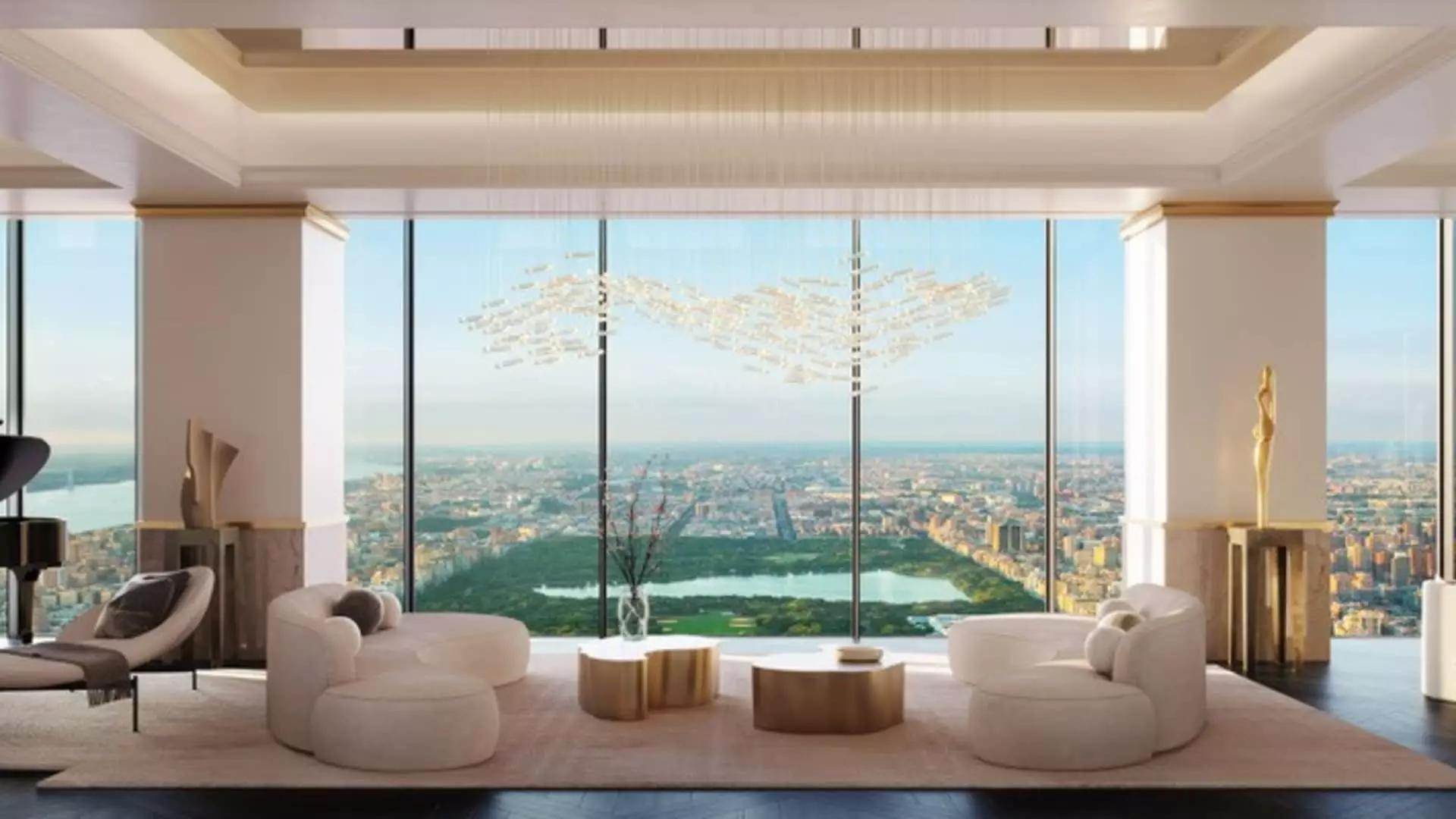The juxtaposition of soaring wealth in luxury real estate against a backdrop of economic volatility is nothing short of remarkable. As the Dow Jones Industrial Average dropped phenomenally—1,679 points in a single day and a staggering cumulative decline of over 6,000 points shortly thereafter—the luxury sector appeared to rumble on defiantly. Case in point: the emergence of an impressive $110 million penthouse atop the iconic Steinway Tower in Manhattan, which has rapidly become the focal point of the city’s opulent real estate market. This counterintuitive phenomenon presents a paradoxical illustration of how segments of the economy can diverge wildly from one another.
The $110 million listing represents not just an extravagant home, but a profound statement against the backdrop of economic anxiety stemming from shifting trade policies and geopolitical uncertainties. While Wall Street investors were preoccupied with erratic market fluctuations, affluent individuals seemingly were not fazed—demonstrating a certain immunity to economic uncertainty that many average investors can only dream of. This scenario challenges our conventional understanding of consumer behavior in the luxury market, as many elite buyers are evidently less influenced by macroeconomic indicators and stock market maneuvers.
Luxury Market Dynamics: Buyer Psychology
Luxury real estate broker Nikki Field’s assertion that her target buyer segment remains unaffected by market volatility raises essential questions about the psychology of wealth. The luxury market is evolving, with high-net-worth individuals focusing on curating top-tier portfolios—world-class properties are becoming essential assets, not mere extravagances. This strategic approach emphasizes a significant shift in luxury purchasing behavior; these elite buyers have positioned themselves not just as consumers, but as shrewd investors looking to capitalize on assets that hold tangible value.
The emotional resilience exhibited by these buyers is crucial. They appear more willing to navigate turbulent waters—highlighting an intriguing psychological phenomenon where wealth breeds confidence and decisiveness. Field’s observations underscore an essential tenet of modern luxury real estate: the most opulent properties are increasingly viewed through the prism of investment viability, rather than mere lifestyle enhancements.
The Impact of Nine-Figure Properties on Market Perceptions
Interestingly, the growing acceptance of properties over nine figures prompts a recalibration of what constitutes luxury. Traditionally, these extraordinary listings were viewed skeptically, often disregarded as publicity stunts. However, data suggests that the sale of high-value homes has become a standard aspect of the luxury market, even tallying record-breaking transactions. This transformation elucidates a shift in the perception of wealth—from curiosity to acknowledgment that high-net-worth individuals will pursue jaw-dropping properties regardless of economic conditions.
Even so, it’s essential to grasp that just because a few extraordinary sales occur doesn’t imply a universal market strength. Real estate expert Jonathan Miller offers a sobering viewpoint, arguing that these high-value sales should be recognized as unique phenomena rather than indicative of the larger luxury market. This perspective aligns with the theory that elite buyers are often driven by factors distinct from local housing trends.
Market Correlation: Tariffs, Inflation, and Buyer Hesitance
Amidst the tide of escalating tariffs and the looming question of inflation, it is telling to observe shifts in buyer behavior. Despite the resilience of the ultra-prime market, some brokers report heightened caution as luxury buyers grapple with uncertainty. The complexities of the current economic landscape prompt many potential buyers to withdraw from negotiations, stifling activity in the broader luxury market.
It raises the critical point that uncertainty is a destructive beta in real estate; financial markets typically dictate consumer confidence. As the wealthiest Americans pivot their resources away from equities and into tangible assets like real estate—driven by anxiety about the stock market—this can fuel inflated property values but also exacerbate hesitance amongst buyers scaling back on their purchasing ambitions.
Shifting Seller Strategies in a Volatile Environment
Moreover, the evolving luxury landscape is prompting sellers to rethink their strategies. The disparity between seller expectations and buyer skepticism is growing, leading to necessary adjustments. Sellers are adapting proactively to a discerning clientele; private negotiations and discreet price adjustments are becoming more common, illustrating a fundamental shift in how real estate is marketed.
At the same time, buyers are sharpening their negotiating tactics, favoring all-cash deals and lengthy inspection periods. The extended timelines mark a significant departure from the once-quick negotiations that characterized the luxury market. Caution has become increasingly mainstream as buyers prioritize due diligence.
In essence, what we witness is not simply a divergence of market segments but rather a series of complex interactions shaped by psychological factors, economic fluctuations, and evolving consumer expectations. The interplay between the stock market and luxury real estate paves the way for a thrilling, albeit uncertain, outlook for the industry. While penthouses like the Steinway Tower listing may seem like exorbitant aspirations, they also reflect a transforming marketplace that challenges our traditional narratives.

